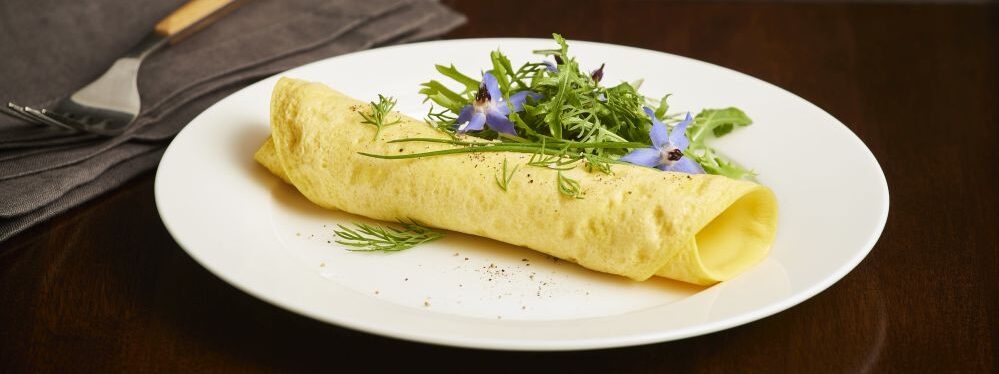The EVERY Company—which pioneered the tech to make egg proteins via precision fermentation—says it will be launching with multinational food companies this year as it ramps up manufacturing capacity to meet demand.
The startup—founded by Arturo Elizondo and David Anchel in late 2014 as Clara Foods—has raised $233 million to date, a pretty jaw-dropping sum although markedly less than the staggering $840 million raised by Perfect Day to try and get its animal-free dairy business off the ground.
According to Elizondo, who has raised capital from investors including Anne Hathaway, Bloom8, McWin Food Systems Fund, Temasek, TO Ventures, Grosvenor, and ZX Ventures, “We still have quite a bit of runway as we’ve been very lean. And part of it is that we’ve never invested in large-scale production capacity [in-house] and we’ve never entered the B2C world [by launching consumer brands].”
He adds: “In 2024, we have two priorities: onboarding additional manufacturing capacity and translating that into products on shelves. So we’re going to start onboarding our first multinationals this year [with EVERY Protein and EVERY Egg White] then launch into foodservice with the EVERY Egg [a liquid whole egg alternative].
“Our product is in limited production,” says Elizondo, who has forged partnerships with ingredients giant Ingredion [for distribution] and AB InBev (manufacturing, scale up). “So we’ve only unlocked metric tons of product for pilot trials when there is a real commitment behind it. We have a couple of multinationals already in the pipeline that we will share very soon.”
‘The big driver is avian flu’
The EVERY Company engineers yeast (Komagataella phaffii) strains to express proteins found in eggs during a fermentation process requiring a source of sugars as the feedstock and has secured ‘no questions’ letters from the FDA in response to its GRAS (Generally Recognized as Safe) determinations for its proteins (here, here, and here).
The proteins are secreted into the broth in the tank and removed via a simple filtration process. The genetically engineered yeast is not present in the final proteins, which would not be classified as ‘bioengineered’ under US labeling laws, says the company.
To date, the startup has developed four ingredients:
- EVERY Protein: a highly soluble, ‘near-invisible’ protein bio-identical to a glycoprotein (ovomucoid) found in egg white, enabling “new-to-the-world, protein-boosted beverages and food products with a neutral sensory profile and optical clarity.”
- EVERY EggWhite: A 1-to-1 egg white replacer. This contains a combination of egg proteins including ovalbumin (the most prevalent protein in egg white) which deliver functional properties including aeration, whipping, gelling, binding, and foam stability.
- EVERY Egg: A liquid whole egg replacement containing EVERY EggWhite, plant-based oils, natural colors and flavors, fiber, and water. While it is designed to match the functionality and sensory experience of eggs, it does not match the complexity of chicken eggs, which contain scores of proteins and other nutrients including choline, lutein and zeaxanthin, B vitamins, iron and selenium.
- EVERY Pepsin: Animal-free pepsin (an enzyme traditionally sourced from pig stomachs) “offering greater quality, purity and secure, and consistent sourcing.” Currently on hold as the firm prioritizes its other ingredients.
In some respects, the business case for alternatives to chicken eggs is more immediately obvious than it is for some other animal-free products, in that food manufacturers have been looking for viable alternatives for years thanks to YoYo pricing and supply challenges that tend to come into sharper focus whenever there’s a fresh bout of avian flu (or a global pandemic).
“For the [liquid] egg piece, the big driver is avian flu,” says Elizondo. “And so that’s where we see a lot of traction, as companies just want to have peace of mind. On the EVERY Egg White side, we’re seeing a lot of interest from companies looking for a methylcellulose replacement, while for EVERY protein, companies are looking to reduce sugars and really boost protein density, which is being further driven by the GLP-1 trend, so they are looking for highly soluble, high-quality proteins that can be used at high inclusion rates.
He adds: “You’re going to see our products in different form factors with different messaging that caters to our customers’ respective audiences. For some the animal free vegan angle is really important, but for the vast majority, it is everything but.
“We’re not really leaning into the vegan angle, our focus is on functionality, so it may be that companies are using eggs but are under pressure to transition to more expensive ones such as free range or organic or cage free, and we can provide a functional alternative.
“For EVERY Egg White, we’re also being told by some bakers that [conventional] egg whites can have a lot of batch-to-batch variability plus seasonal variations. Because of our process, we can match functionality every single time.”
‘We have proven that the technology works at scale’
But do the economics of precision fermentation really stack up for the kinds of ingredients Elizondo is making from genetically engineered yeast?
According to Elizondo: “We’re not able to compete with the very cheapest eggs yet, but can compete with cage-free, pasture raised, and more functional forward eggs.
“For us to truly deliver on our mission and our impact, we have to get to the lowest possible COGS and be able to compete head-to-head with a commodity battery caged eggs. But that is a consequence of scale. We’ve proven that the technology works at scale, we’re producing regularly in 100,000-L+ fermenters making metric tons of product, so it’s now a matter of continuing to dial up scale so we have enough capacity to ultimately bring the cost down.”
In the meantime, he says, “Many companies are prepared to pay a premium for stability and peace of mind for their supply chain, so oftentimes they’ll see us as a hedge to the conventional egg supply chain.”

The EVERY Company recently debuted EVERY Egg—billed as the “world’s first liquid egg made without the hen”—at an exclusive dinner at Chef Daniel Humm’s 3-star Michelin restaurant, Eleven Madison Park. The product, which is currently available for sampling to foodservice operators, has been many years in the making, says Elizondo.
“We’ve historically only been making proteins or combinations of proteins, but this is the first comprehensive solution we’ve developed using multiple ingredients that can really serve as a true one-to-one drop in replacement for eggs in any application.
“We were not willing to put something out there that was half-baked. As I said the other day on LinkedIn, food isn’t like software. If you mess up the first time, it’s much harder to recover. It leaves a (literal) bad taste in people’s mouths and people don’t easily forget that.
He adds: “The yolk is key to a true whole egg experience; it confers the color and the flavor, as egg white alone is pretty bland; the yolk also provides the fatty experience that rounds out the experience.”
As for availability, he says: “The biggest challenge is that we are very supply constrained right now. We’re selling everything we can make and we can’t make enough EVERY Egg right now [for a commercial launch], so we’re in the process of securing more and more manufacturing capacity to be able to meet demand.”
Contract manufacturing vs in-house production
The EVERY Co currently works with several contract manufacturers (CMOs) that are “mainly overseas,” says Elizondo. “But as the space has cooled down, there is less competition for manufacturing capacity and we’re being really opportunistic and securing capacity that was really hard to come by in the last two to three years.”
He adds: “Some CMOS have all the downstream processing (DSP) we need, some have partial DSP, and some have nothing, so we are investing into some of the manufacturing partners to secure that capacity and invest in the necessary DSP required.
“Fortunately, we don’t need specialized equipment so we have a lot more optionality to work with a host of different manufacturing partners.”
While there is more capacity coming online in the US, he says, “With new facilities, there’s usually at least a two and a half to three year lead time before that comes online, so until then we have to secure existing capacity.”
As for using CMOs rather than building facilities in-house, he says, “We have a pilot plant in our Daly City headquarters where we can keep iterating and optimizing the process, and then use contract manufacturers to essentially just copy and paste that, drive scale and drive unit economics. If you’re vertically integrated, you have a lot more control, but it comes at a hefty price.
“But in general, I’ve always thought, why do we have to own our assets when there are dozens of companies across the world that have millions of liters of fermentation capacity and decades of experience making things like animal feed products? They already have the talent and the infrastructure.”
As for the partnership with brewing giant AB InBev, he says: “It was initially a joint development partnership, where we were going to use some of their capacity to really prove that the technology works at scale with the unit economics where they need to be, and we have checked that box.
“The second part was exploring what true large scale dedicated AB InBev production could look like with our proteins and our yeast, and that’s what we’re currently exploring.”





